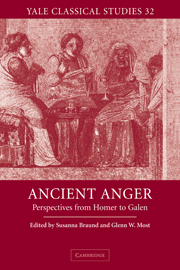Book contents
- Frontmatter
- Contents
- Notes on contributors
- Acknowledgments
- List of abbreviations
- Introduction
- Chapter 1 Ethics, ethology, terminology: Iliadic anger and the cross-cultural study of emotion
- Chapter 2 Anger and pity in Homer's Iliad
- Chapter 3 Angry bees, wasps, and jurors: the symbolic politics of ὀργή in Athens
- Chapter 4 Aristotle on anger and the emotions: the strategies of status
- Chapter 5 The rage of women
- Chapter 6 Thumos as masculine ideal and social pathology in ancient Greek magical spells
- Chapter 7 Anger and gender in Chariton's Chaereas and Callirhoe
- Chapter 8 “Your mother nursed you with bile”: anger in babies and small children
- Chapter 9 Reactive and objective attitudes: anger in Virgil's Aeneid and Hellenistic philosophy
- Chapter 10 The angry poet and the angry gods: problems of theodicy in Lucan's epic of defeat
- Chapter 11 An ABC of epic ira: anger, beasts, and cannibalism
- References
- Index of passages cited
- Index of proper names
- Index of topics
Chapter 7 - Anger and gender in Chariton's Chaereas and Callirhoe
Published online by Cambridge University Press: 22 September 2009
- Frontmatter
- Contents
- Notes on contributors
- Acknowledgments
- List of abbreviations
- Introduction
- Chapter 1 Ethics, ethology, terminology: Iliadic anger and the cross-cultural study of emotion
- Chapter 2 Anger and pity in Homer's Iliad
- Chapter 3 Angry bees, wasps, and jurors: the symbolic politics of ὀργή in Athens
- Chapter 4 Aristotle on anger and the emotions: the strategies of status
- Chapter 5 The rage of women
- Chapter 6 Thumos as masculine ideal and social pathology in ancient Greek magical spells
- Chapter 7 Anger and gender in Chariton's Chaereas and Callirhoe
- Chapter 8 “Your mother nursed you with bile”: anger in babies and small children
- Chapter 9 Reactive and objective attitudes: anger in Virgil's Aeneid and Hellenistic philosophy
- Chapter 10 The angry poet and the angry gods: problems of theodicy in Lucan's epic of defeat
- Chapter 11 An ABC of epic ira: anger, beasts, and cannibalism
- References
- Index of passages cited
- Index of proper names
- Index of topics
Summary
A genre concerned with love and separation, attachment and loss (however temporary), is likely to have a high emotional content, and the earliest of the five extant Greek novels, Chariton's Chaereas and Callirhoe, is nothing if not emotional. A central part of the author's aim is to give us an imaginative apprehension of what his characters feel, and to make us feel it ourselves; the depiction of emotion is thus largely descriptive, the goal being the creation of mood, individual or collective. One emotion, however – anger – plays a critical role in the narrative. This fact has perhaps not been fully appreciated; certainly it has not received much prominence in scholarly writing on this novel, and wider implications have not been explored. In this chapter I want to look closely at the presence (and absence) of anger in the text, examining it particularly through the lens of gender and its ancient constructions.
The essential events need first to be described; and I begin with the opening chapter of the novel. On the occasion of a feast of Aphrodite in Syracuse, the god Eros contrives a meeting between the divinely beautiful Callirhoe and the handsome Chaereas, who belong to the two leading families in the city. They fall instantly in love, and popular demand ensures their marriage despite family rivalries. But following the wedding Callirhoe's many disappointed suitors plot revenge against Chaereas, “a hopeless pauper, nobody's superior, competing with kings,” as one of them calls him (1.2.3).
- Type
- Chapter
- Information
- Ancient AngerPerspectives from Homer to Galen, pp. 163 - 184Publisher: Cambridge University PressPrint publication year: 2004
- 1
- Cited by



